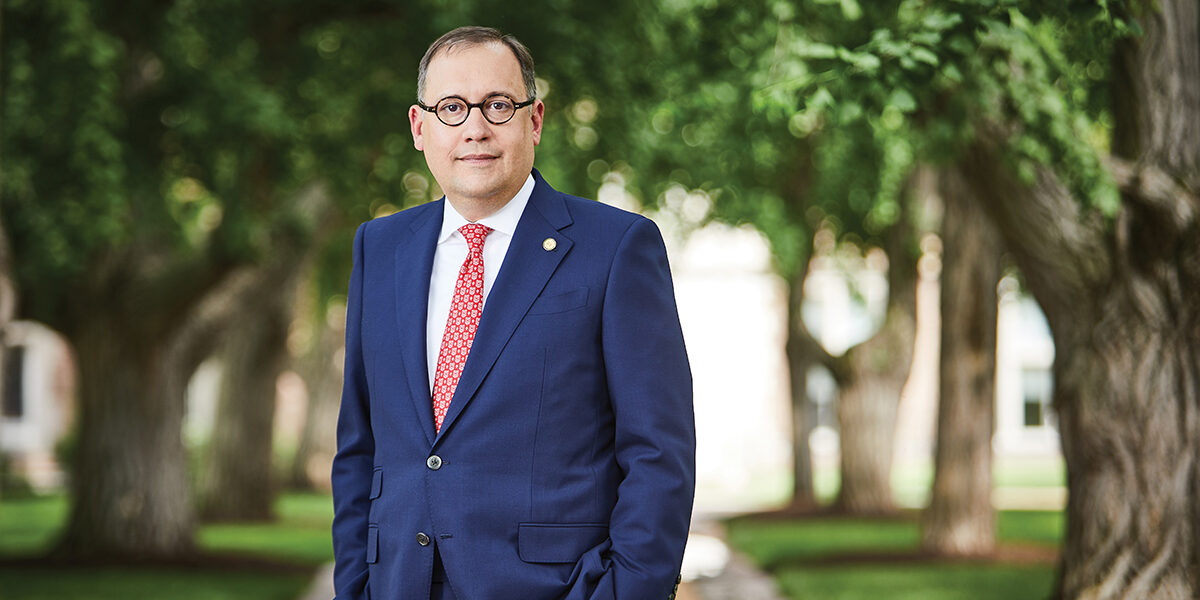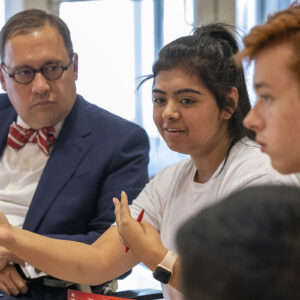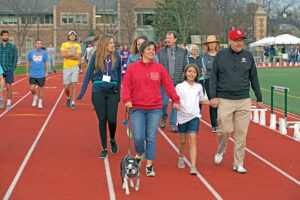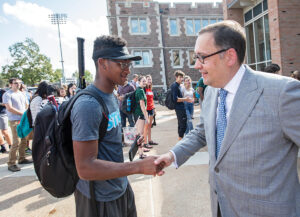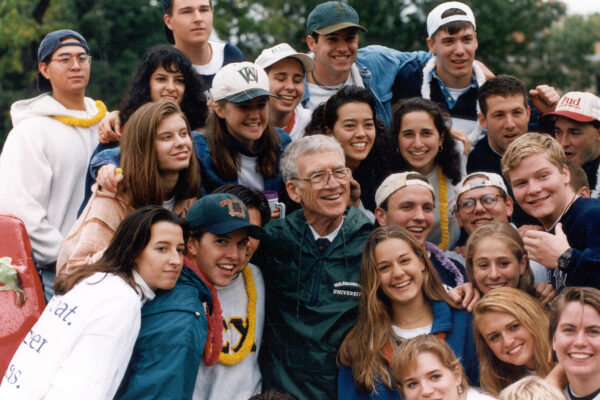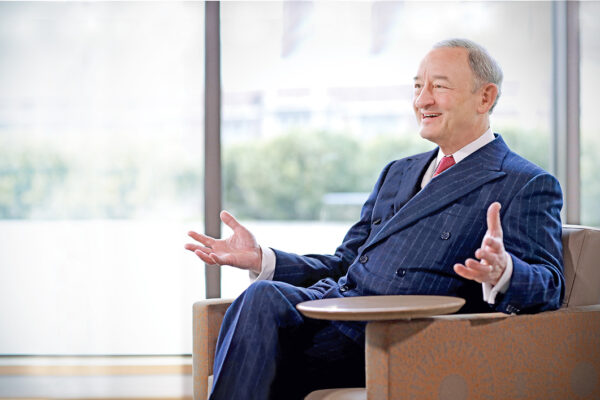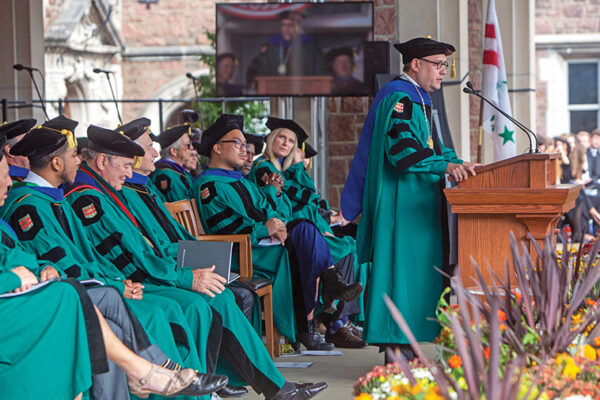Lee Epstein, the Ethan A.H. Shepley Distinguished University Professor, had no idea that Andrew Martin — whom she’d mentored as a PhD student and later co-authored a book with — was about to become chancellor of Washington University. Her partner was on the search committee but had kept the secret to the end.
“I was so stunned, I had to go into another room, and — it sounds sappy, but I cried,” she confides. “I’d never really experienced tears of joy before. But I was so happy for him and so happy for WashU. Andrew is extremely talented in many ways that match our needs: He’s diligent, he’s creative, he’s honest. He’s hard-working and incredibly efficient. And on top of it all, he’s fun to be around, a great conversationalist, always full of ideas.” Very few people have his equal access to both brain hemispheres, she adds: “He’s very clear, very organized in his thinking, yet incredibly creative in how he looks at problems. He can spin out all kinds of implications that never would have occurred to me.”
With the announcement of Martin as chancellor, there were initially a few raised eyebrows: Is this someone who could bring a fresh and diverse perspective? But those who knew him knew he’d steer the right kinds of change.
“In under five minutes,” recalls one of his graduate students, Michael Nelson, MA ’11, PhD ’14, “people were emailing and texting that it was a wonderful decision and totally unsurprising, even though nobody had any idea he was in the running for the job. It just fit.”
One of Martin’s last undergraduates, Scotty Jacobs, BA ’16, remembers thinking, “This makes so much sense. WashU is so lucky.” And then, as it sank in a little deeper, Jacobs thought, “Wow. Not who I expected. But this is amazing.”
For only the second time in its history, Washington University would be led by one of its own: a 45-year-old wunderkind who’d broken precedent by being hired back as a faculty member only two years after graduation, then gone on to chair his department at age 33 and become a vice dean of the law school — without a law degree — at 38. He’d been gone only four years, to a prestigious post at the University of Michigan, and his calm, practical wisdom had been sorely missed.
Now he was back to stay.
Thrilled to be away at college, Martin lugged his suitcase into his freshman dorm. Cinder-block, no air-conditioning. His new roommate, who had attended an elite high school in Winchester, Virginia, came from a family where generations had gone to William & Mary.
Most of the kids at Martin’s high school in West Lafayette, Indiana, knew they’d wind up running their family’s farm. He’d chosen William & Mary because it was a public university that respected his budget constraints. And he’d wound up in this all-male dorm at the far end of campus because, he now realized, he was “one of the only ones dumb enough to have actually checked ‘don’t care’ on the application.”
But Martin was fiercely smart, and until now he’d been a little isolated. He saw his childhood self as “very geeky, wired a little bit differently from everybody else” — even his own family. If you chose three people from the planet at random, he doubted you could find any three more different than him and his two brothers. Since age 11, he’d been counting down the days until he could leave Lafayette in search of people whose world was bigger and more like his — crammed with knowledge and questions and ideas.
He took his dad’s advice: “Treat college like a job.”
He took his dad’s advice — “Treat college like a job” — and studied from 8 in the morning until 6 at night. Then he relaxed, hanging out, for the first time in his life, with people whose backgrounds, beliefs and perspectives were far different from his own. He stopped making assumptions.
Martin double-majored in math and government because those were his two abiding interests. At age 7, he’d decided for some reason that George H.W. Bush was a better nominee than Ronald Reagan, and he’d gotten up early the next morning to see who’d won the primary. This started a trend where he’d get up after every primary to check the news. Theirs wasn’t an especially political family, but he liked figuring out what was going on in the world.
He also liked the clarity of math. His dad had been a high school math teacher before becoming a banker, so the knack was probably genetic. But there were so many ways to apply math to solve real-world problems…
Martin didn’t even realize the most important way, for him, until he asked a friend’s dad, dean of the liberal arts college at Purdue University, to go to lunch with him and maybe help him figure out his next step. The dean listened for a bit and then asked, smiling, “Andrew, have you ever heard of this thing called political methodology?”
It slid into the keyhole and unlocked his future. By the end of lunch, he’d memorized the best PhD programs to mesh his two passionate interests: Rochester, Washington University and CalTech.
Rochester turned him down. But after one visit to WashU, he canceled his flight to L.A.
Now, on a day when he’s talked for an hour with Chancellor Emeritus William H. Danforth, learned about breakthroughs at the med school’s Center of Regenerative Medicine, chatted with undergrads, and met with faculty, Martin feels a flush of euphoria. It’s not so long ago that he was walking this campus with a backpack, looking for strong coffee.
He loved those grad school years, and he made good friends — including one who kept saying, “There’s this woman you should meet.” Her name was Stephanie, and she shared his wry, sarcastic wit and values. But she was living in Seattle. About a year later, he had to fly to San Francisco, so he dutifully contacted this Stephanie person and asked if she’d like to meet him for dinner.
She said no.
A few days later, she called and said she’d changed her mind; she would travel to meet him. (A friend had asked why she refused. “Well, ’cause it’s kind of weird,” she said, then relented.) They met in a coffee shop, and he’d twisted his ankle jogging, so he came in limping and nervous. But despite the ankle, they walked around San Francisco, then parted until dinner that evening. When he showed up in a blue blazer and bow tie, she was charmed. And by the time he’d accepted his first faculty appointment, at Stony Brook University in New York in 1998, they were engaged to be married. Two years later, when their answering machine took a message from the chair of WashU’s political science department, Stephanie guessed it instantly: “They want you back.”
She was right, though later he’d learn it had been a “very contentious” discussion. “Are we going to bring someone back to our faculty who was here as a student only two years ago?” It just wasn’t done — except when someone was as obviously right for the job as Andrew Martin. He created and taught an undergraduate quantitative methodology course. (“Tough, but a genius,” the survivors reported.) He bolstered the graduate program and wound up in charge of it.
He was a founding director of the Center for Empirical Research in the Law. By 2007, he’d become department chair.
In 2011, Martin took his first sabbatical ever, moving his wife and 3-year-old daughter, Olive, to Idaho for a year. His quantitative analysis of Supreme Court decisions and many other aspects of law and politics was still winning acclaim, but it no longer excited him.
Where he felt a rush of exhilaration was in administration, where he could tackle big, messy problems, bring order out of chaos, and assemble brilliantly talented teams that could actually get things done in the glacially slow world of university politics.
Everything in life was political, he’d realized. He didn’t have to stay locked in a single discipline; he could turn his analytical skills on any problem in a university.
It felt like a fork in the road. But being an empiricist, he wanted a year to be sure.
“Why am I doing this? It’s nowhere near as much fun or as challenging as the administrative work.” — Andrew D. Martin
In the quiet of the mountains, he read and thought. He put together the best grant proposal of his life, about machine learning and the law. He co-authored a book. He wrote an article so insightful that it snagged him a job offer at another university. And yet, as he gazed past his iMac’s screen at Lake Pend Oreille with the slope of Gold Hill behind it, all he could think was, “Why am I doing this? It’s nowhere near as much fun or as challenging as the administrative work.”
Some academics need unbroken stretches of solitude to noodle their nonlinear way to a breakthrough. Martin was a different sort: the consummate problem solver, linear and efficient. He missed the energy of collaboration; the challenge of juggling a dozen balls while driving strategy forward; the satisfaction of bringing some sticky, thorny problem all the way to resolution. Even his initials were ADM.
It was time, he decided, to shift his energy to administration.
Martinis, lounge music, witty innuendo … the “Dean Martin” farewell party in 2014 was a success despite the guests’ sorrow. After his sabbatical, Martin had accepted the role of vice dean at the law school, which was “counterintuitive — I’m not a lawyer — but a perfect job, because it gave me experience in all the infrastructure of a university.” He’d hoped to next become dean of an arts and sciences college.
He didn’t want to leave WashU. It was here that he’d refined his intellectual powers, hit his stride, learned to lead. Not to mention that his cherished daughter, Olive, had been born here, a fact that would tie their family to St. Louis forever. If he left now, he thought sadly, he’d never come back.
Still, he was ready for that next challenge, and there was no opportunity at Washington University at the time. So he applied to be dean of the College of Literature, Science, and the Arts at the University of Michigan.
In Ann Arbor, he racked up accomplishments, boosting academic excellence, diversity, inclusion, fundraising. He established a program that braided learning with real-life experience and career goals.
Then, in late 2017, he learned there was an opening at his alma mater. Washington University’s chancellor was stepping down.
Martin’s brother and sister-in-law, their three kids and Bernese mountain dog, and his sister-in-law’s parents were all staying at his house when he flew home from St. Louis. He’d just been through a two-day grilling, starting with a Thursday evening dinner at the Saint Louis Club (“I now know three other dinners were taking place across town”) and then interviews on Friday. Nobody but Stephanie knew where he’d been and why. On Saturday, he escaped the madhouse and took Olive, just turned 10, to her tournament Little League game in a small town about 15 miles south of Ann Arbor.
He was sitting in a lawn chair on the side of the school’s ball field, watching as his daughter came up to bat. Fifth inning of a six-inning game, runners on all the bases. She whacked the ball, scoring a run that tied the game.
And his phone rang. Area code 314.
“I am calling to offer you the position of the 15th chancellor of Washington University.”
— Craig Schnuck
Surely it was too early for them to have reached a decision. Maybe they just had some more questions. He answered, and Craig Schnuck introduced himself formally as the chairman of the board of trustees. I just saw you yesterday, Martin thought. “I am calling to offer you the position of the 15th chancellor of Washington University,” Schnuck continued. (As it happened, the search and executive committees had convened after the last interviews Friday afternoon to discuss the final four candidates. The executive committee then met for further discussions and to vote. They voted unanimously to select Martin.)
Dazed, Martin accepted. Olive, sensing the call’s intensity, shot him a curious look. He called Stephanie. Then he called Rebecca Brown, the WashU colleague he’d recruited to work with him in Michigan, and asked if she wanted to go home. And then, goosebumps subsiding, he watched the rest of Olive’s game and drove home to share the news with Olive along with Stephanie.
As Martin guides me to a quiet table in the Danforth University Center (the DUC), two colleagues from his law school days approach, one demanding to know why his socks are so boring, the other demanding a hug. “We’ve missed you, man,” the sock critic says.
Turns out the man in the impeccable pinstriped suit and starched white collar sports jazzy socks everywhere but a funeral. Today’s are just a muted purple and charcoal print, but he says the sock designer he discovered years ago, Vivek Nagrani, once named a pair The Martin in his honor. Like his sense of humor, his mushy love for his daughter and his appointment as chancellor, the socks are an unexpected yet obvious match.
I’ve read his fiery 2018 commencement speech at the U of M, in which he deplored “the way the academic world has been sacrificing free speech on the altar of safety.” Is there any kind of safety a university ought to provide? “The physical safety of those in our community is paramount,” he says. “But I do not think it’s the university’s responsibility to keep people from having their feelings hurt or from hearing ideas they might find patently offensive.”
He’s caught his share of flak about being a white male at a time when many wished the university would have chosen someone who, well, wasn’t. “Look, I am who I am,” Martin says. “You’ve gotta look at the work I’ve done and the work I’m gonna do. You can’t hire one person who checks every box.” He makes a rueful face. “Of course, I don’t check any of ’em.”
What scares him most about the job isn’t political critique, though. It’s the possibility of “letting down the community.”
What scares him most about the job isn’t political critique, though. It’s the possibility of “letting down the community.” Does he care what people think of him? “I care a lot,” he says, “but the things I care about have to do with integrity and judgment. I don’t care if people like me so much, or if they like the decisions I’ve reached. But if they view me as someone with unquestionable integrity and good judgment, that’s something I aspire to.”
“Why Boston terriers?” I ask, veering deliberately. The Martins are on their second, and the breed — sturdy, intelligent, dogged — seems apt. He says they needed a little dog, because they like to travel and they’re “morally opposed to putting a dog underneath an airplane.” The current pup’s name is Danny: “Not our name. He came as Danny, and we thought it would be psychologically too complicated for him to change his name.”
Later, I call Stephanie, curious to see what Martin’s like at home. “Same guy,” she says. “He likes structure at home as much as he likes structure in the office. Olive and I are both slightly messier. He’s more Alex P. Keaton. He needs a little help winding down.” When he does, the wry sarcasm shifts to a “silly, sophomoric sense of humor,” she confides. You can imagine her eye rolls. You can also tell that she loves the way he “still keeps in touch with his guy friends from college.” As a family, the Martins watch a lot of sports, and Olive and her dad play gin rummy. He loves good food and wine — a refinement that still bemuses his mother — as well as golf; his fast, little car (a red Volkswagen Golf R, manual transmission); and the Backspin channel on Sirius, old-school hip hop and rap.
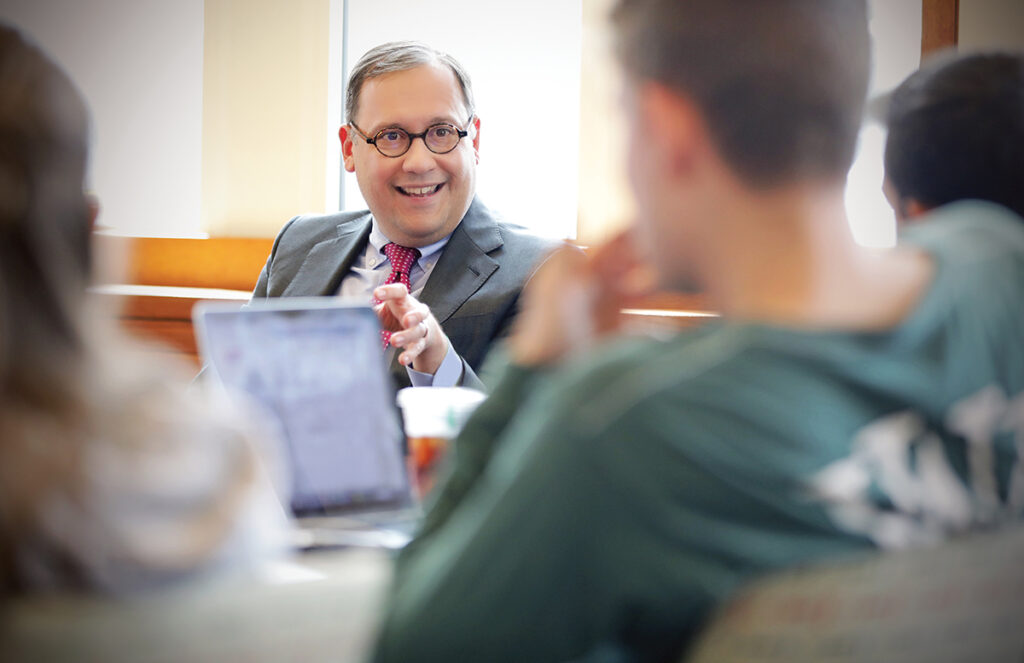
In April, Martin visits a graduate class in higher education administration. He gives an overview of his life that, diagrammed, would be straighter than a beeline, with nary a flowery digression. Martin ends with the questions he’s been asking himself: “How do we become a truly inclusive campus? How do we build an academic program to unleash the talent all our undergraduates bring? How do we build a larger number of programs of true international distinction?”
The students have questions of their own.
How’s he going to begin moving toward need-blind admissions? “For the next decade, front and center for us is going to be support for financial aid,” Martin says. “I think we’re going to need to raise at least an additional billion dollars in endowment. And we can do that.” He pauses. “I want every undergrad to be able to have the same experience here as the wealthiest students. At Michigan, we looked to see where the gaps were. Six percent of students didn’t have a laptop. It was impossible for students on financial aid to study abroad — or to take an unpaid internship in New York.” He tackled all of that, erased the obstacles. Now he’s working on filling in similar gaps at WashU.
“For the next decade, front and center for us is going to be support for financial aid. … I want every undergrad to be able to have the same experience here as the wealthiest students.” — Andrew D. Martin
When a student asks about the social experience of inclusivity, though, Martin throws the ball back: “There is work that can be done, particularly in student affairs, to help build community and meaningful inclusion. But at the end of the day, it’s got to come from the students. Certain norms are exclusionary. A lot of kids don’t have mom’s and dad’s credit card in their pocket, and if spring break is about going to Colorado to ski … I think if students decided this was really important, they could actually lead on this issue in ways that would be infinitely more effective.”
Asked how the university can contribute to the surrounding community, he lights up. Earlier, he told me that “the important role this university plays in the city is unique in higher education.” Now, he says, “I think we have a moral responsibility to the city of St. Louis. We are — literally — a beacon on a hill. How do we serve the community? We’re not a social service agency, but with our educational mission, our research mission,
our patient-care mission, there are lots of ways to serve.”
He mentions Cortex, “a wild success that’s created 6,000 jobs and turned empty warehouses into one of the most vibrant parts of the city. Yet that hasn’t at all affected the black/white income disparity in our city. It hasn’t affected the poverty rate.” Amazing as it is, the success “didn’t trickle down. We also have to be thinking about things we can do to help lift all boats — and for that, I think about education and health care.”
The next student begins: “Assuming you have finite resources —”
“A fair assumption,” Martin inserts with a grin.
“— do you double down on the programs that are effective?”
“You have to have a mixed strategy,” he says. “The places you have true distinction, if you are not continuing to invest in them, you are going to fall behind. You need to look at your menu of other programs: What financial investment would it take to move this into the very, very best? What things are here that would give us an advantage?” For example, WashU will “continue to invest in biology and plant sciences, because we have one of the world’s best faculties, botanical gardens and the Danforth Plant Science Center here. It’s kind of obvious.”
One of the last questions touches what, for him, is a raw nerve. (He’s even asked Epstein to teach a course with him in spring 2020 called “Free Speech on Campus.”) “If you don’t have freedom of speech on a college campus,” he says, “game over. We can’t be an institution where there’s a particular orthodoxy that we all have to subscribe to. It’s our responsibility to point out dumb ideas. If we have people taking provocative views that an overwhelming majority of our community thinks are downright wrong, it’s our responsibility to have that person come and talk, and do it in a safe way, and make sure that it triggers discussion.”
Do that, and you’re fulfilling the purpose that drew him to university life in the first place: knowledge creation. People flock to academic life for various reasons, he says. Some will say it’s the flexibility; others will rhapsodize about the life of the mind. “What I love is that everybody you run into is trying to better understand how things work, what the heck’s going on beneath the surface, what went on in the past, or what’s going to happen in the future.”
It opens up the world.
